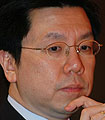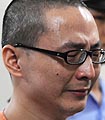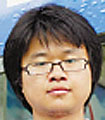| Innovative IT Tycoon

Kai-fu Lee, the Taiwan-born icon in the Chinese IT world, announced on September 6 that his new company, Innovation Works, would invest about 800 million yuan ($115 million) over the next five years in Chinese technology startups. The announcement came two days after Lee resigned from the presidency of Google China to start his own venture.
Lee, 47, is an information technology executive and a computer scientist. He earned a Ph.D. in computer science from Carnegie Mellon University in 1988. After spending two years at Carnegie Mellon as an assistant professor, he had worked at Apple Computer, Cosmo Software and Microsoft.
In 2005, Lee joined Google to help the owner of the world's most used Internet search engine develop its operations in China. Over the past four years, Google's market share in China rose from 16 to 29 percent.
Drunk Driver Gets Life

A U-turn in Sun Weiming's fate happened on September 8, when the former company executive, who was thought to be given China's first death sentence for drunk driving, was spared the capital punishment and given life imprisonment instead by the Higher People's Court of southwest China's Sichuan Province.
Sun, 30, was found to have driven under the influence of alcohol on December 14, 2008, after his car collided with four other vehicles in Chengdu, capital of Sichuan, killing four and injuring one.
The Chengdu Intermediate People's Court sentenced Sun to death in July on charges of "endangering public security."
The ruling immediately made headlines across China, as drunk driving, which is reportedly responsible for about 20,000 deaths in road accidents every year, is becoming a public concern. Previously, drunk drivers were usually convicted of "traffic offenses," a charge that brings jail time between three and seven years.
The second-instance judgment issued on September 8 said that Sun's original ruling was overturned because he had committed an indirect intentional crime.
A senior judge at the Supreme People's Court, China's top judicial organ, has suggested Sun's case be referenced in future trials of drunk driving cases with fatalities.
Discrimination Fighter

Lei Chuang, a 22-year-old college graduate, has received China's first permit for a person with Hepatitis B to work in the food industry. The young crusader in the fight against discrimination related to chronic Hepatitis B said he hoped the success would help his peers lead a better life.
Lei began to devote himself to the campaign of protecting the rights of Hepatitis B carriers in 2007, after a state-owned enterprise rescinded a job offer to his elder brother who later tested positive for Hepatitis B.
Lei has since organized various Hepatitis B education activities. He has also written to national lawmakers, academicians of the Chinese Academy of Sciences and presidents of almost all higher education institutions in China, appealing for their help to eliminate discrimination against people with Hepatitis B, especially in employment and higher education enrollment.
This July, a new regulation on the implementation of the Food Safety Law lifted a ban on Hepatitis B carriers working in the food industry.
"A large population and a weak economic base are the two main features of our country. The population issue is a major problem for the country's comprehensive, coordinated and sustainable development."
Chinese Vice Premier Li Keqiang, stressing the importance of continuing the family-planning policy and keeping a low fertility rate to ensuring economic development and people's livelihood at a September 7 meeting in Beijing
"We can't go to Copenhagen because we don't have the money."
Mohamed Nasheed, President of the Maldives. The president said that even though his country is under threat from climate change, he cannot afford to go to a summit on the issue in December
"Replacing the dollar with an artificial currency would solve some of the problems related to the potential of countries running large deficits and would help stability."
Detlef Kotte, one of the authors of a report released by the UN Conference on Trade and Development. The report said that the system of currencies and capital rules that binds the world economy is not working properly, and was largely responsible for the financial and economic crises
"Apart from massive loss of life, these attacks would have had enormous worldwide economic and political significance."
John McDowall, head of Scotland Yard's counterterrorism command, after a British jury convicted three terrorists on September 7 of plotting to blow up jets over the Atlantic with home-made liquid bombs
"The world is getting an awful lot smaller and it is getting very hard to find places that are so far off the beaten track."
Steve Backshall, a member of a team that discovered 40 previously unidentified species in the crater of Mount Bosavi in Papua New Guinea | 